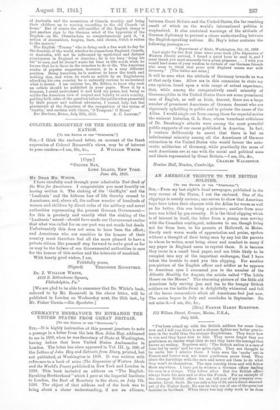GERMANY'S ENDEAVOUR TO ESTRANGE THE UNITED STATES FROM GREAT BRITAIN.
[To THU EDITOR Op TILE " EFROTATOR.".1 SIE,—It is highly instructive at this present juncture to note a passage in a letter from the late Hon. John Hay, addressed to me in 1899, when he was Secretary of State at Washington, having before that been United States Ambassador in London. The letter has since appeared in Vol. III. (p. 100) of the Letters of John Hay and Extracts from Diary, printed, but not published, at Washington in ]908. It was written with reference to a book of mine (The Expansion of Western Ideals and the World's Peace) published in New York and London in 1899. This book included an address on " The English- Speaking Brotherhood " which I gave at the Imperial Institute in London, the Earl of Rosebery in the chair, on July 7th, 1898. The object of that address and of the book was to bring about a closer understanding, if not an alliance, between Great Britain and the United States, the far-reaching result of which on the world's international politics it emphasized. It also contained warnings of the attitude of German diplomacy to prevent a closer understanding between the English-speaking nations. Mr. Hay's letter contains the following passages :— " Department of State, Washington, Oct. 21,1899. Last night for the that time since your book (The Expansion of Western Ideals) arrived, I found a quiet hour to read it, and must thank you most sincerely for a great pleasure.... I wish you would lend some of your wisdom to certain of our German friends who seem to think that peace with England moans war with Germany." [The italics are mine.] It will be seen what the attitude of Germany towards us was at that early time. Allow me in this connexion to state my own opinion, based upon a wide range of actual experience, that, while among the comparatively small minority of Germanophiles in the United States there are some prominent men of English, as well as Irish, descent, there are a large number of prominent Americans of German descent who are vigorously upholding in public and in private the cause of the Allies. I would single out from among these for especial notice the eminent historian, G. L. Beer, whose trenchant criticisms of Dr. Dernburg's attacks were among the most powerful public supports of our cause published in America. In fact, I venture deliberately to assert that there is but an infinitesimal minority among all the Americans of German extraction in the United States who would favour the auto- cratic militarism of Germany, while practically the mass of such Americans are at one with the social and political aims and ideals represented by Great Eritain.—I am, Sir, &o.,
Newton Hall, Newton, Cambridge,
CHARLES WALDSTEIN.


































 Previous page
Previous page